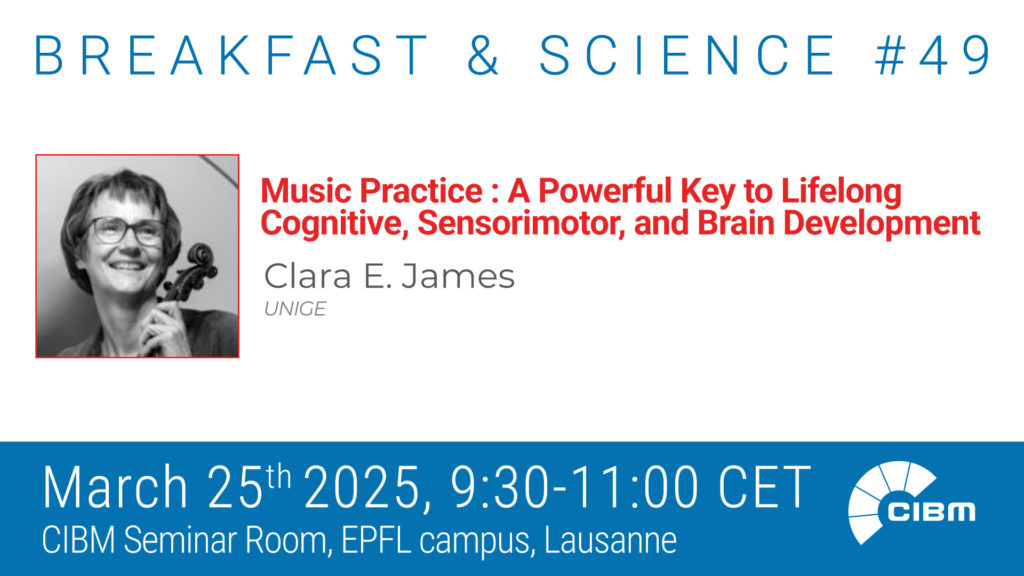
On the 25th of March 2025, the CIBM Breakfast & Science Seminar 49, was given by Clara E. James, fomr the Universtity of Geneva. The event was chaired by Jonas Richiardi, Head, CIBM DS CHUV-HUG Imaging for Precision Medicine Section.
Music Practice : A Powerful Key to Lifelong Cognitive, Sensorimotor, and Brain Development
Abstract
Music practice powerfully drives brain and behavioral plasticity through its multimodal and dynamic nature. Alan Baddeley, creator of the working memory concept, described Looking back and looking forward, perfectly capturing music performance’s reliance on retrospective memory and prospective cognition. Guided by auditory, sensorimotor, and visual feedback loops, this process strengthens executive functions -particularly working memory-, sensorimotor control, and adaptive decision-making, reinforcing structural and functional neuroplasticity.
Although the influence of music on brain and behavior has been acknowledged since Plato, the nature-nurture debate persists in modern science. Are musicians’ brains different from the outset, or do these changes result from training-induced plasticity? The presentation will start by addressing this question, providing compelling evidence that music training actively reshapes the brain.
This ability of music training to sculpt brain and behavior makes it a potent developmental and therapeutic tool. This presentation will highlight randomized controlled trials demonstrating its role in strengthening development across the lifespan—from fostering cognitive and sensorimotor development in children to preserving cognition and enhancing neural resilience in aging and mild cognitive impairment.
Finally, the presentation will introduce the protocol of an ongoing SNSF-funded project involving HES-SO Geneva, FPSE UNIGE, CIBM, and CHUV/UNIL. This large-scale, two-year randomized controlled trial examines the impact of group music and visual arts training on young children’s executive functions and emotional regulation, incorporating demographic factors in the analyses. The ultimate goal of this study is to use multimodal neuroimaging and advanced data-driven analyses (machine learning) to develop a predictive model that links cognitive outcomes to functional and structural brain plasticity over the early academic years, with and without artistic enrichment.
Clara E. James
UNIGE HES-SO Genève
About the speaker
Clara E. James uniquely merges her background as a professional musician with academic credentials. PhD in cognitive neuroscience and MSc in cognitive experimental psychology (UNIGE), she is Full professor and Dean of research at the Geneva School of Health Sciences, University of Applied Sciences and Arts Western Switzerland HES-SO, and Privat-Docent at the FPSE UNIGE. Despite a late career start, she has built a strong publication record in peer-reviewed journals (https://orcid.org/0000-0001-7480-0682).
Research Focus: James explores the cognitive, sensorimotor, and neural effects of music training, particularly its developmental and therapeutic benefits. Supported by the Swiss National Science Foundation (SNSF grants 125050, 170410, 214977), Alzheimer Suisse, and private funding, her research could demonstrate how musical practice drives structural and functional brain plasticity across the lifespan. Through randomized controlled trials, she highlights music practice’s role in enhancing children’s cognitive and sensorimotor skills and its protective effects against age-related decline, in healthy and pathological aging.
Her research also addresses musicians’ musculoskeletal health, examining psychological and physical factors affecting performance and well-being.
Public Engagement: Featured regularly in the media, James shares her research with the public. The SNSF selected her for AcademiaNet (https://www.academia-net.org/profile/clara-e-james/88124), a platform showcasing outstanding women in science, where she shares both academic work and media contributions.

